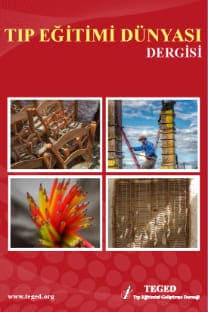ÇERÇEVE EĞİTİM PROGRAMI GELİŞTİRME REHBERİ-2: MEZUNİYET ÖNCESİ ÇERÇEVE EĞİTİM PROGRAMI
Yeterliğe dayalı eğitim, eğitim programı planlama, öğrenim stratejileri
ÇERÇEVE EĞİTİM PROGRAMI GELİŞTİRME REHBERİ-2: MEZUNİYET ÖNCESİ ÇERÇEVE EĞİTİM PROGRAMI
___
- Gülpınar MA. Uzmanlık Eğitimi ve Çerceve Eğitim Programı Geliştirme Rehberi. Tıp Eğitimi Dünyası 2011; 30:29-59.
- Christensen L, Karle H, Nystrup J. Process-outcome interrelationship and standard setting in medical education: the need for a comprehensive approach. Medical Teacher, 207; 29, 972-7.
- Harden RM., Crosby JR, Davis MH, Friedman M. AMEE Guide No. 14: Outcome-based education: Part 5: From competency to meta-competency: a model for the specification of learning outcomes. Medical Teacher 1999;21(6):546-52.
- Dent JA, Harden RM (Ed.). A Practical Guide for Medical Teachers. 3rd Edition, Churchill Livingstone:Elsevier, 2009.
- Linn RL, Norman EG. Measurement and Assessment in Teaching. New Jersey: Merrill, Prentice Hall, 2000.
- Ramani S & Leinster S. AMEE Guide no. 34: Teaching in the clinical environment. Medical Teacher, 2008, 30, 347-364
- Norcini J & Burch V. AMEE Guide No. 31: Workplace-based assessment as an educational tool. Medical Teacher, 2007, 29, 855-71.
- Harden RM, Laidlaw JM, Ker JS, Mitchell HE. AMEE Guide No. 7. Part 1: Task-based learning: an educational strategy for undergradute, postgraduate and continuing medical education. Medical Teacher, 1996a; 18(2) :7-13.
- Harden RM, Laidlaw JM, Ker JS, Mitchell HE. AMEE Guide No. 7. Part 2: Task-based leraning: an educational strategy for undergradute, postgraduate and continuing medical education. Medical Teacher, 1996b; 18(2) :91-8.
- Gülpınar MA. Tıp Eğitiminde Program Geliştirme: Kuram ve yaklaşımlar. Tıp Eğitimini Geliştirme Derneği VI. Ulusal Tıp Eğitimi Kongresi Özet Kitabı, Aydın, 2010, 16-24.
- The Royal College of Physicians and Surgeons of Canada. The CanMEDS 2005 physician competency framework. Better standards better physicians better care. http://meds.queensu.ca/medicine/obgyn/pdf/CanMEDS2005.booklet.pdf adresinden 06 Agustos 2010 tarihinde ulasılmıstır.
- The University of New South Wale (UNSW). Graduate capabilities. http://www.med.unsw.edu.au/medweb.nsf/resources/GraduateCapabilities/$file/GraduateCapabilities.pdf adresinden 06 Agustos 2010 tarihinde ulasılmıstır.
- World Federation for Medical Education. Basic Medical Education: WFME Global Standards for Quality Improvement. WFME Office: University of Copenhagen Denmark, 2003, http://www3.sund.ku.dk/Activities/WFME%20Standard%20Documents%20and%20translations/WFME%2 0Standard.pdf adresinden 04 Kasım 2011 tarihinde ulasılmıstır.
- Parmelee DX, Michaelsen LK. Twelve tips for doing effective Team-Based Learning (TBL). Medical Teacher 2010; 32: 118–122
- Hawkins R.E. & Holmboe E.S. (2008). Constructing an Evaluation System for an Educational Program, In: Holmboe E.S. & Hawkins R.E., Practical Guide to the Evaluation of Clinical Competence, Phidelphia: Mosby, Elsevier, pp. 216-237.
- Wass V. & van der Vlueten C. (2009). Assessment in Medical Education and Training, In: Carter Y. & Jackson N., Medical Education and Training, Oxford: Oxford University Press, , pp.105- 128.
- Dijkstra J.,. Van der Vleuten C.P.M, Schuwirth L.W.T. A new framework for designing programmes of assessment. Adv in Health Sci Educ, 2009, DOI 10.1007/s10459-009-9205-z.
- Gülpınar MA. Tıp egitiminde program gelistirme: kuram ve yaklasımlar. Tıp Egitimini Gelistirme Dernegi VI. Ulusal Tıp Egitimi Kongresi Özet Kitabı , 02-05 Haziran 2010.
- Gülpınar MA. Tıpta Uzmanlık Eğitiminde Program Geliştirme ve Ölçme-Değerlendirme: Program Değerlendirme Yaklaşım ve Yöntemleri. TTB-UDEK Ulusal Yeterlik Kurulu 3. Çalıştayı, 92-102, Ankara: Türk Tabipleri Birliği Yayınları, 2008.
- Goldie J. AMEE Education Guide No. 29: Evaluating Educational Programmes. Medical Teacher; 28 (3): 201-224.
- ISSN: 1303-328X
- Yayın Aralığı: 3
- Başlangıç: 2000
- Yayıncı: Tıp Eğitimini Geliştirme Derneği
ÇERÇEVE EĞİTİM PROGRAMI GELİŞTİRME REHBERİ-2: MEZUNİYET ÖNCESİ ÇERÇEVE EĞİTİM PROGRAMI
Mehmet Ali GÜLPINAR, Berrak Ç. YEĞEN, Sibel KALAÇA
TIP EĞİTİMİ ANABİLİM DALLARI V. KIŞ OKULU SONUÇ RAPORU
Mehmet Ali GÜLPINAR, Berrak Ç. YEĞEN, Sibel KALAÇA
ÜÇÜNCÜ SINIF TIP ÖĞRENCİLERİNDE PROFESYONALİZM FARKINDALIĞINI ARTTIRMA: BİR ÇALIŞTAYIN SONUÇLARI
Ümmü Zeynep AVŞAR, Zeliha Cansever, Hamit Acemoğlu Abdul SATTARKHAN, Ümit AVŞAR
Hülya Aybek, Ilgaz Akdoğan, Şükran Tok, Türkay Nuri Tok
KALP SESLERİ DERSLERİNDE MODEL KULLANIMININ ÖĞRENCİ MEMNUNİYETİ VE ÖĞRENME ÜZERİNE ETKİSİ
